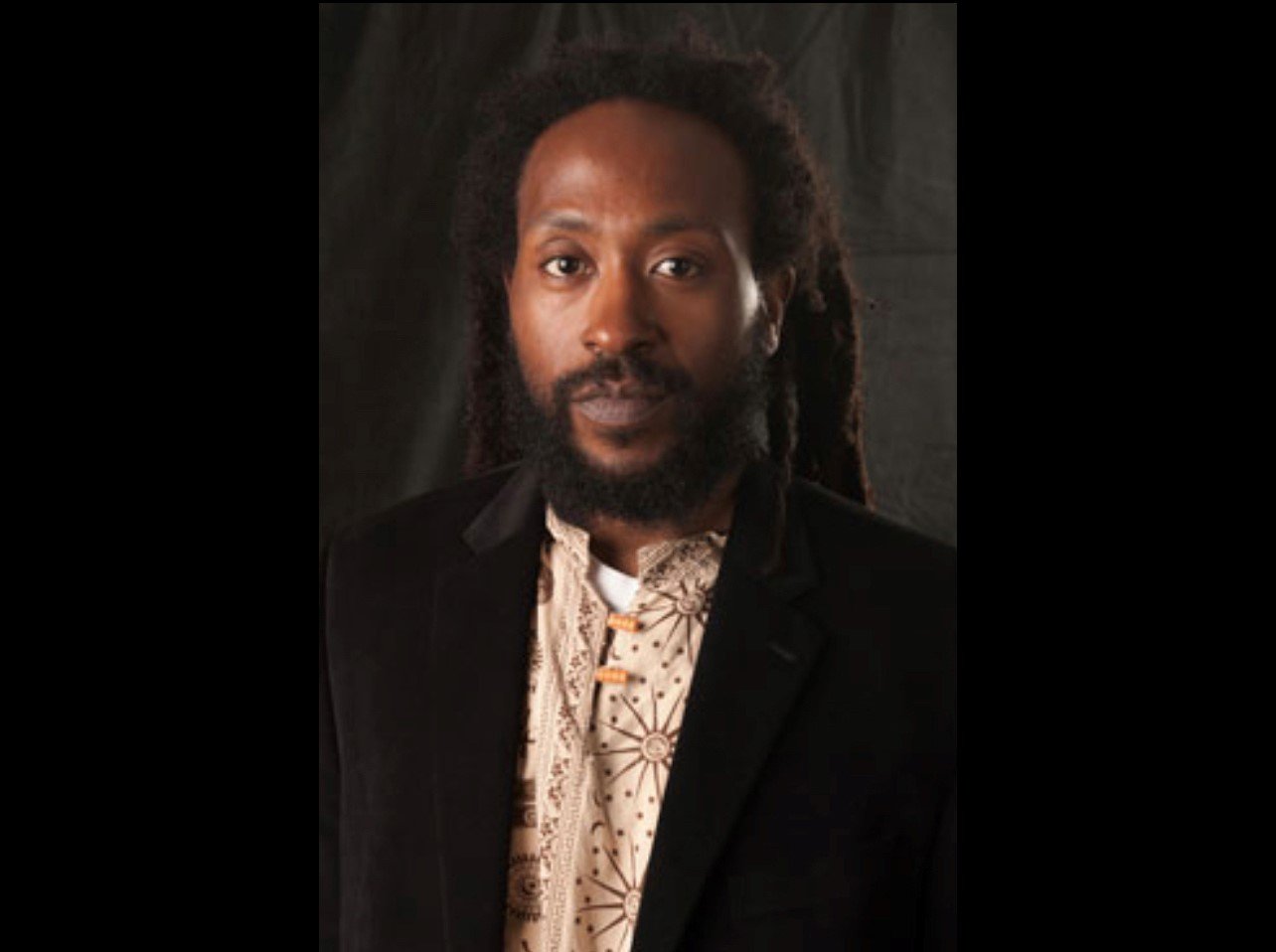Police tried to silence Jalil Muntaqim’s speech at SUNY-Brockport
by Tim Farrell, published in the SF Bay View
After great controversy and attempted repression from the white supremacist state and its agents, former political prisoner Jalil Muntaqim delivered a powerful message both in-person and online on April 6, 2022.
Jalil Muntaqim speaking, with ASL interpreter Talasi.
The veteran Black Panther Party (BPP) and Black Liberation Army (BLA) member was originally slated to speak in-person at SUNY Brockport before the National Fraternal Order of Police and right-wing pundits vehemently opposed him exercising First Amendment rights, thought to be a cornerstone of universities.
“Individuals, particularly police, try to silence anyone speaking against the norm, their view of what is right and wrong. They are not about the First Amendment. They determine who can and cannot speak, and that is a very slippery slope. Consider that when they determine who can and cannot speak, it is a police state,” Muntaqim remarked. “The U.S. empire has sanctions against 70 nations across the world to maintain capitalist imperialism and white supremacy.”
Alternate plans
Refusing to stand up against white supremacy, SUNY Brockport moved the event online, but the University of Rochester Black Student Union stepped in to host Muntaqim’s speech in person in addition to the virtual component. Instead of speaking before an audience of perhaps 50-to-100 people, the backlash led to the speech being seen by about 50 people in-person and more than 400 more online with Brockport professor Rafael Outland facilitating the talk.
Brockport professor Rafael Outland facilitated the talk.
Muntaqim himself was a member of his high school’s Black Student Union. “I was always confronting racism and the institution of racism. More often than not, we go along to get along,” he explained. “I became a leading member of the BSU in my school, advocating for Black studies. All studies were Eurocentric, so we had to organize to bring Black studies to school. We went to San Jose City and San Jose State, talking about Black studies in teach-ins.”
BPP and fighting white supremacy
His relationships in those days also led to him becoming a member of the BPP. “We had a doo-wop group back in the day, finishing second in a team competition in San Francisco. Some of those boys had become members of the Black Panther Party. I signed up at age 16, becoming a part of development and going to political education classes, which were a necessary part of the struggle,” he recalled. “We had to understand history and the politics of the day. I was fully engaged from age 18 until I was recruited into the Black underground, which was the BLA.”
Muntaqim explained that BPP co-founders Bobby Seale and Huey Newton always had plans for an armed struggle. The BLA came from the BPP, so if you were a Black Panther, you couldn’t join any other underground movement. “The struggle has always been, and will always be, against white supremacy. If white people are superior, then someone else has to be inferior. We have lived under that lie for more than 400 years, or 500 years if you are Indigenous.”
He was first arrested at age 19 in San Francisco in his lifelong fight against white supremacy and capitalist colonialism. “There have always been points of resistance, a tradition of resistance against white supremacy in the history that they don’t teach us. The BPP did not evolve out of a vacuum. This is what they try to suppress – this history. If you knew it, you would humanize yourself.”
Muntaqim noted the historical significance of slogans like “I am a Man” that came out of the Memphis Black sanitation workers’ strike in 1968 and “Black Lives Matter” that originated after the murder of Trayvon Martin and went international after the murder of George Floyd. “The state represses why we make statements like those. White supremacy dehumanizes and degrades the experience of Black, Brown and Indigenous people. The media has demonized everyone who resisted white supremacy. We are honoring the legacy of resistance for freedom, independence and liberation.”
Criminalization of dissent
“Police maintain and control Black, Brown and Indigenous people in their communities. It is why they tried to silence me as if I have nothing of value to say. They use race and class to divide us while we fight for crumbs. We live in an autocracy, where the rich rule. People buy themselves into political office. We have the choice of which rich person we want to rule. They don’t want you to have that understanding of this system and the true dynamics of what we are engaged in,” Muntaqim stated.
While he was enslaved at Attica Correctional Facility, Muntaqim taught other enslaved people about the events from 1961 through 1966, but once he began to talk about the Black Panther Party in 1966, he was put in solitary confinement. “They don’t want youth trained out of a criminal mentality. The criminal injustice system makes money off and controls the population of Black, Brown and Indigenous people. Dissent is criminalized. The state wants you to believe that no one is imprisoned for dissent,” he commented.
One of the most insidious of the state’s repressive tactics was COINTELPRO, the FBI’s counterintelligence program that began in 1956 against communist activity but was primarily used later to kill, imprison or exile anyone fighting for Black independence. “(J. Edgar) Hoover was instrumental in developing a program for the imprisonment and exiling of Marcus Garvey, the greatest organizer of Black people in modern times. He was falsely charged with tax evasion because they had to get rid of him,” described Muntaqim, who initiated a political prisoners’ petition to the United Nations when he was housed in San Quentin State Prison, the first time such a petition was written and documented by prisoners.
On July 12, 1978, U.N. Ambassador Andrew Young told a French newspaper, Le Matin de Paris, that “we still have hundreds of people that I would categorize as political prisoners in our prisons.” In speaking that truth, Young was widely criticized with a motion to impeach him in Congress and President Jimmy Carter eventually relieving him of his position.
“When you speak out about the existence of political prisoners and the U.S.’s denial of it, you are labeled a terrorist or a hatemonger for trying to rid yourself and others from their white supremacy and capitalist imperialism,” Muntaqim said. “We talk about things like the school-to-prison pipeline because it is a reality. It is not happenstance or a mistake. It is policy and regulations. Many people are not accepting that reality because all of us are traumatized, which has become normalized.”
Second chance
Muntaqim was finally released from his enslavement in October 2020. “I have been given a second chance, a second opportunity. There are people who have lost their lives in the trauma in which we have engaged in this country. I know the police are agonized by losses they have suffered. As much as I feel that, I feel that for all the families of those murdered by police,” he said. “There is loss across the country. When are we going to raise our humanity and not have these kinds of fights? We are not addressing the division in this country to the point that we are denying one another’s humanity.”
His work with Citizen Action of New York has allowed him to be a community organizer, engaging in all kinds of work challenging the systems of oppression. “We have to look at the history of this country and address how we got where we are today. There are individuals who want to maintain this system as it is. If we are going to change our conditions, we need to get rid of something. We need to get rid of this aberrant idea of white supremacy. We need to abolish this.”
Muntaqim was one of the chief architects of the Spirit of Mandela’s International Tribunal in which the U.S. government, its states and specific agencies were charged with genocide against Black, Brown and Indigenous people. An international panel of jurists found the U.S. guilty on all five counts brought forward: racist killings, hyper incarceration, political incarceration, environmental racism and public health racism. The event was held Oct. 22-25, 2021, at the Malcolm X and Dr. Betty Shabazz Center in Harlem.
Mass incarceration
The rate of incarceration in the U.S. is nearly five times higher than most other countries in the world. “The U.S. prison system is a slave plantation. The 13th Amendment exception clause informs us that slavery still exists in the prison system,” Muntaqim noted. “Mass incarceration feeds the multi-billion-dollar industry. Where are they making all this money from? The deliberate school-to-prison pipeline. Corporations invest in the prison system and its slave labor. It was Benjamin Franklin who came up with the idea of the prison system.”
Thirteenth Amendment, Section 1: Neither slavery nor involuntary servitude, except as a punishment for crime whereof the party shall have been duly convicted, shall exist within the United States, or any place subject to their jurisdiction.
The Supreme Court ruled in Ruffin vs. Commonwealth in 1871 that prisoners are “slaves of the state” who only have those rights granted by the state. “We have been deluded into believing that slavery has been abolished, but it has not. We want to abolish the slave system in its entirety. The laws say chattel slaves cannot be held as private property, but they can be held by the state,” he informed. “Black, Brown and Indigenous people are ushered into the system deliberately. Why? Some people are profiting off it.”
Next steps
Muntaqim makes it clear that abolition includes getting rid of the carceral system and all that it entails but that it also goes well beyond that. “We need to get rid of anything and everything that dehumanizes, diminishes or devalues the humanity of Black, Brown and Indigenous people. We should abolish anything that does that so we can restore a common humanity,” he stated. “If you think like a white supremacist, you will act like a white supremacist. If you think like a capitalist, you will act like a capitalist. If you think like a revolutionary, you will act like a revolutionary.”
One of the main outcomes Muntaqim is excited about after the International Tribunal is the formation of a People’s Senate, which has been in the works since October. “It is about governing ourselves. Real people governing real people, not corporations governing people,” he described. “We have been trained by the state of capitalism to focus on individualism and competition. Cooperation and unity are the opposite.”
“The system has been used primarily to deny the humanity of others. Find common ground with other people so we can ensure our survival on this planet by any means necessary. We take nothing off the table in terms of self-defense to defy this madness. Understand the harm that has been done to us as a people. What are you going to do about that? What are you going to do to change that?” he asked.
Timothy Farrell is a freelance writer who also has more than 25 years working in college athletics. He is a member of the Cuyahoga County Jail Coalition based in Cleveland, Ohio, and a member of numerous national organizations including Prison Lives Matter and Spirit of Mandela. He can be reached at tpfarrell22@gmail.com.
View the live conversation with Jalil Muntaqim on April 6, 2022 HERE.


